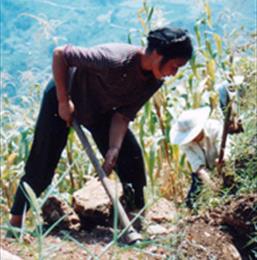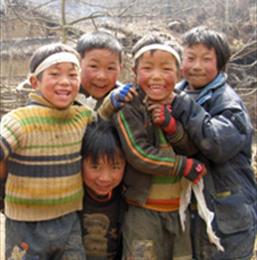February 2000
28th February 2000
Sugu Hamlet 6 - Integrated Projects
Sugu Hamlet 6 is a steep one-hour climb from the nearest road, and has poor agricultural land with frequent poor harvests. DORS first began assisting this Yi minority hamlet in 1997 with a micro-credit scheme and a small irrigation water supply project. Although this assistance benefited some of the 19 households, the overall situation in the hamlet was still in need of improvement.
DORS held a meeting with villagers last autumn and the following ideas were put forward - assistance with school fees, development of economic trees, management of woodland and connection to the electricity supply.
In February DORS paid the school fees of 7 children (including full fees for the three children of the one particularly poor family). One hundred walnut saplings were delivered to each household, which will provide improved cash income for the villagers in several years time. Also DORS will provide assistance in the long-term management of their collective woodlands, which are under increased pressure.
A contract was signed for 18,000 RMB (1,385 GBP) to connect the hamlet to the grid, improving the standard of living by providing electricity for lighting and other household uses such as grain milling. Additional funding is being provided by the township government. The income and living standard of these Yi minority people will be improved, with their full participation, through these integrated projects
School Fees
This semester, as ususal, DORS has provided school fees to children in particularly poor villages. In total 188 children have been supported, at a total cost of 36,736 RMB (2,826 GBP). Thanks to MRDF for providing funding for this project.
Initially, a micro-hydropower project was considered, but the villagers were concerned about the possible impact on their irrigation water for growing rice. Therefore, they decided to get an estimate for connection to the grid. As the cost was higher than for hydropower, each household contributed 700 RMB towards the project. DORS provided 15,000 RMB (1,153 GBP). A contract was signed with the electricity supply department, and the villagers provided labour free of charge. A transformer and power cables were installed and the villagers are now enjoying the convenience of electric lighting for the first time. DORS contribution was 82 GBP per household.
Na'er Village Forestry
Li Weixiang, Na'er Village Party Secretary, approached DORS on behalf of the 156 villagers, for help in the re-afforestation of 70 mu (4.6 hectares) of their barren land. Working in partnership with DORS, the villagers formulated a plan to plant the area with duzhong (Eucommia ulmoides), houbo (Magnolia officinalis), and liu sha (Cryptomeria fortunei). Planting of the 14,000 saplings has just been completed.
The duzhong and houbo were planted for their medicinal and other non-timber forest products (NTFP) whilst the liu sha, a type of cedar, will be used for house building and other domestic uses. The ratio is weighted towards liu sha as the villagers are unsure about the future market for the NTFP, and were more inclined to plant the liu sha for timber, even though permission is required from the County Forestry Bureau for any felling. However, they still wanted some form of economic crop. Unfortunately, due to the harsh conditions and altitude (2000+ m) of Na'er village, the choice of species is very limited.
All harvesting of the NTFP and timber will be done within a sustainable forest management (SFM) plan, which will ensure continued use and expansion of the area. Additionally the villagers have asked DORS to help in devising a SFM plan for their collective woodland, which at the moment is being used on an ad hoc basis.
This semester DORS started supporting some of the children from the poorest households to attend the village school. DORS provided part of the funding used to rebuild this school and also implements a micro-credit scheme in the village


